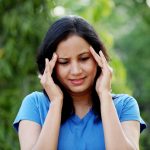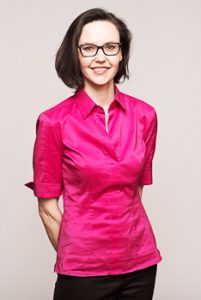
NCAH, which stands for non-classic congenital adrenal hyperplasia is a fairly common
genetic disorder sharing many symptoms with polycystic ovarian syndrome (PCOS). It has fairly high prevalence, with statistics showing between 0.6%-9% of women with androgen excess have NCAH, with even higher prevalence in Mediterranean, Middle-Eastern Ashkenazi Jewish and Indian populations (1). In technical terms, NCAH involves a defect in the 21-hyrdoxylase enzyme which converts 17-OH progesterone to cortisol. This leads to a constellation of hormones out of balance, including low cortisol levels, high androgens and elevated LH (luteinizing) hormone, all resulting in changes in ovarian function. Signs that you may have non-classic congenital adrenal hyperplasia:
Signs of high androgens: Acne (in 33%) (2), especially cystic acne on the chin or jawline. This is often the primary clinical symptom (3). Male-pattern baldness (8%) (4) or head hair thinning. Hirsutism (60%)(5) – coarse hairs in mustache area, chin, upper chest, abdomen, or back. This is often a presenting feature (6).
Menstrual dysfunction: Anovulation = no ovulation Oligomenorrhea (54%) = irregular menstruation Amenorrhea (4%) (7) = absent menstruation
Polycystic ovaries (up to 40%)(8)
Early puberty (first periods usually at 10 years of age or under) (1), and the development of pubic hair, armpit hair, and/or increased sweat odor prior to age 8 in girls (24). Tall as a child, short as an adult (9). Clitoromegaly (13% >10, 20% <10) (10) – enlargement of the clitoris in women
Signs of low cortisol: Poor stress tolerance Tendency for anxiety Fatigue Low blood pressure
Decreased fertility This condition is the big mimicker of polycystic ovarian syndrome (PCOS) due to the increased concentration of LH, high levels of androgens and changes in ovarian and gonadotropin function. Features that may differentiate a diagnosis and suggest NCAH include early age of puberty, signs of low cortisol, and lack of insulin resistance. NCAH can impact fertility: Infertility is the presenting symptom in 13% of women with NCAH (11), however many women with NCAH are relatively fertile. Pregnancy rates of 50% are reported in untreated patients with NCAH, but they increase to 93-100% after treatment. These rates, however are from studies where diagnosis of NCAH was made after symptoms were seen, thus represent only those patients who experience symptoms (12). The risk of subfertility is the result of problems with ovulation as well as high levels of progesterone during the follicular phase (first half) of the menstrual cycle which may interfere with the quality of cervical mucus (which is important to allow the sperm to travel). Elevated 17-OH progesterone and progesterone during the follicular phase can also cause menstrual irregularity and result in inadequate maturation of the uterine lining and impaired implantation (13). How to test for NCAH: Testing usually begins with a morning test for 17-OH progesterone, androstenedione and testosterone taken during the follicular phase of the menstrual cycle (before ovulation). 17-OH progesterone concentrations between 170-300ng/dl warrant further testing (14). Randomly measured 17-OH progesterone can be normal with NCAH. Definitive diagnosis is made through an ACTH stimulation test. Blood is collected, and then ACTH is administered. A repeat blood sample is taken after 30 or 60 min, and cortisol, 17-OH progesterone, and progesterone concentrations are determined. 17-OH progesterone levels of >1500ng/dl indicate NCAH (15). In older individuals with NCAH, levels might be between 1000-1500ng/dl (16). Genetic testing can be done but should not be used as a first-line screening because there are 127 known combinations of genetic mutations ranging from partial enzyme function loss to complete loss (17). Most commercially available screening panels will not be able to detect all possible mutations (18).
Treatment for NCAH: In adolescent and adult women, goals include: regulating the menstrual cycle, decreasing the signs of high androgens/testosterone, stimulating ovulation, supporting cervical fluid, supporting the uterine lining, and supporting normal cortisol levels. A healthy diet is very important. The diet should consist of whole-foods and include plenty of high-quality protein, healthy fats, and lots of vegetables and fruits. Drink plenty of water and minimize caffeine, alcohol, and sugar. Organic foods should be eaten as much as possible. Counseling is important. Many women struggle with the loss of feminine identity as a result of high levels of androgens, and the subsequent affects on mood and sexuality. It is also important to counsel about fertility expectations. Fertility appears to decline earlier in women with untreated NCAH. Couples should be encouraged to try to conceive before age 35. Standard medical treatment is only recommended for those presenting with symptoms as the treatment can have side effects. The general goal of treatment is to reduce the symptoms of hyperandrogenism. Glucocorticoids may be used to raise cortisol levels in children or adolescents with abnormal skeletal maturation or height. Glucocorticoids may also be recommended in women to raise cortisol levels, support regular ovulation and improve fertility. In some cases medications for ovulation induction may be necessary for fertility (19). There are also natural treatments to consider: Acupuncture – to stimulate ovulation, decrease sex hormones and precursors, and regulate the menstrual cycle (20,21). Herbal treatments such as Vitex agnus-castus (Chasteberry) to regulate menstrual cycle and support ovulation (22), Cimicifuga racemosa (Black cohosh) to low doses can lower LH levels (22) and thicken the endometrial lining before ovulation (23), Serenoa repens (Saw palmetto) for androgenic hair thinning and acne by modulating testosterone levels (24). D-chiro-inositol – increases in ovulation, decreases in free testosterone (25). Evening primrose oil: support healthy and fertile cervical fluid Herbs and nutrients to support the adrenal glands, the glands that produce cortisol. If cortisol levels test significantly low, adrenal glandular supplements, or herbal combinations containing licorice root will help with energy levels and stress tolerance.
If you have been diagnosed with PCOS based on bloodwork, ultrasound and symptoms especially high androgens, but are not seeing in improvement in your symptoms with your treatment plan, consider further testing to check for NCAH. This is especially true if you have signs of low cortisol (fatigue, poor stress tolerance, anxiety), experienced early puberty, and do not have signs of insulin resistance (easy weight gain, carrying weight around the central abdomen, family history of diabetes). NCAH is a very treatable condition once it is diagnosed, but it is very often missed because the clinical picture is so similar to PCOS.

Dr. Shawna Darou is a licensed and registered Naturopathic Doctor, who graduated from the Canadian College of Naturopathic Medicine (www.ccnm.edu) at the top of her class and was the recipient of the prestigious Governor’s Medal of Excellence. Naturopathic medicine is her second career, her first being Engineering Chemistry from Queen’s University. She now uses her analytical brain and problem solving skills especially in the complicated arena of hormonal health, and in solving health puzzles. Dr. Shawna Darou N.D. is a specialist in women’s health care and fertility who has treated thousands of women in her Toronto clinic since 2004. She is a dedicated and caring doctor with a gentle approach who is committed to the health of her patients. Dr. Darou’s is also an avid health writer, and her popular health blog can be found at http://darouwellness.com/blog-posts/ Outside of the office, Dr. Darou is the mother of two beautiful children who inspire her to evolve the medical model in order to reform healthcare for the next generation.
http://pcosdiva.com/2016/03/diagnosis-are-you-misdiagnosed-ncah-the-big-pcos-mimicker/?inf_contact_key=a391e4c139067957f3b37e6e3553402852742d0052aa0b38e8cf3b6938e0fee8




As a sign of gratitude for how my wife was saved from PCOS, i decided to reach out to those still suffering from this.
ОтветитьУдалитьMy wife suffered pcos in the year 2013 and it was really tough and heartbreaking for me because she was my all and the symptoms were terrible, she always complain of heavy menstruation, and she always have difficulty falling asleep . we tried various therapies prescribed by our neurologist but none could cure her. I searched for a cure and i saw a testimony by someone who was cured and so many other with similar body problem, and they left the contact of this doctor who have the cure to pcos . I never imagined polycystic ovary syndrome. has a natural cure not until i contacted him and he assured me my wife will be fine. I got the herbal medication he recommended and my wife used it and in one months time she was fully okay even up till this moment she is so full of life. polycystic ovary syndrome. has a cure and it is a herbal cure contact the doctor for more info on drwilliams098675@gmail.com on how to get the medication. Thanks admin for such an informative blog.
I am Shelley from Los Angeles,California, I want to testify on how i got cured from pcos, I have suffered from pcos since the year 2011 with so mush pain,that i have to spend so mush money getting pain relief in the hospital, and I have visited several doctor ,but all to no avail, my world was gradually coming to an end because of the pain during my menstrual period until i saw a post in a health forum about a herbal Dr Williams who use herbal portion in curing people from different kind of diseases including pcos, at first i doubted if it we be able to cure me, but i decided to give it a try, when i contacted this herbal doctor via his email, he prepared a herbal portion and sent it to me via courier service, when i received this herbal medicine, he gave me step by step instructions on how to apply it, when i applied it as instructed, i was completely free from pcos just for 1 months of usage,i we recommend this to all my friend family in the world today who still suffering from fibroid you can contact him through his email on drwilliams098675@gmail.com for help.
ОтветитьУдалитьI am Shelley from Los Angeles,California, I want to testify on how i got cured from pcos, I have suffered from pcos since the year 2011 with so mush pain,that i have to spend so mush money getting pain relief in the hospital, and I have visited several doctor ,but all to no avail, my world was gradually coming to an end because of the pain during my menstrual period until i saw a post in a health forum about a herbal Dr Williams who use herbal portion in curing people from different kind of diseases including pcos, at first i doubted if it we be able to cure me, but i decided to give it a try, when i contacted this herbal doctor via his email, he prepared a herbal portion and sent it to me via courier service, when i received this herbal medicine, he gave me step by step instructions on how to apply it, when i applied it as instructed, i was completely free from pcos just for 1 months of usage,i we recommend this to all my friend family in the world today who still suffering from fibroid you can contact him through his email on drwilliams098675@gmail.com for help.
ОтветитьУдалить